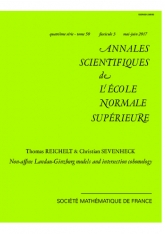Modèles de Landau-Ginzburg non affines et cohomologie d'intersection
Non-affine Landau-Ginzburg models and intersection cohomology

- Consulter un extrait
- Année : 2017
- Fascicule : 3
- Tome : 50
- Format : Électronique
- Langue de l'ouvrage :
Anglais - Class. Math. : 14J33, 14M25, 32S40, 32S60, 14D07, 34Mxx, 53D45
- Pages : 665-753
- DOI : 10.24033/asens.2330
Nous construisons un modèle de Landau-Ginzburg pour les intersections complètes numériquement effectives dans les variétés toriques lisses. Il s'agit de compactifications partielles de familles de polynômes de Laurent. Nous démontrons un théorème de symétrie miroir qui exprime le $\mathcal {D}$-module quantique de la partie ambiante de la cohomologie de la sous-variété comme un $\mathcal {D}$-module de cohomologie d'intersection défini par cette compactification partielle. Nous en déduisons des propriétés de Hodge de ces systèmes différentiels.
Systèmes de Gauß-Manin, $\mathcal {D}$-module hypergéométrique, variété torique, cohomologie d'intersection, transformation de Radon

